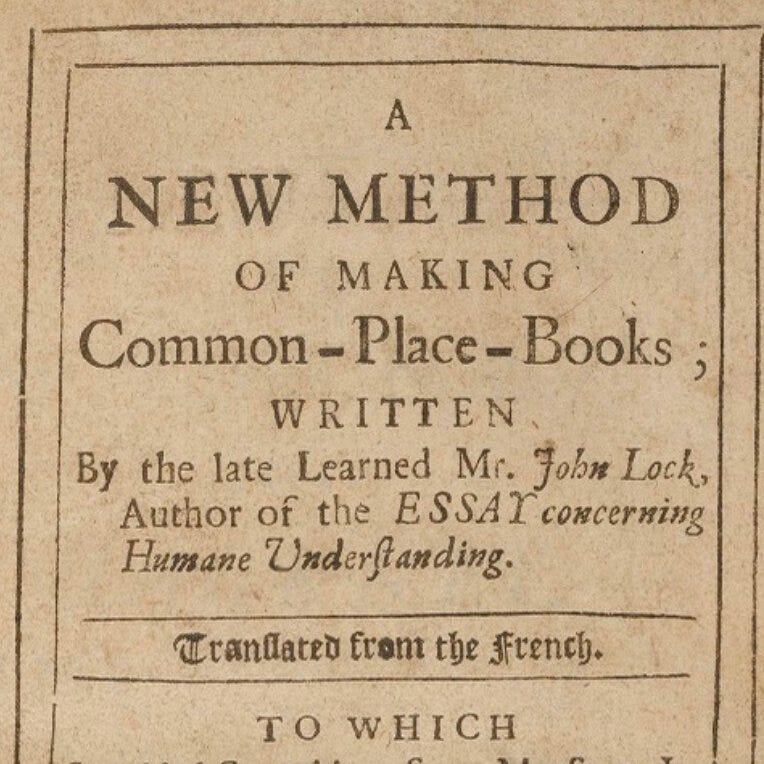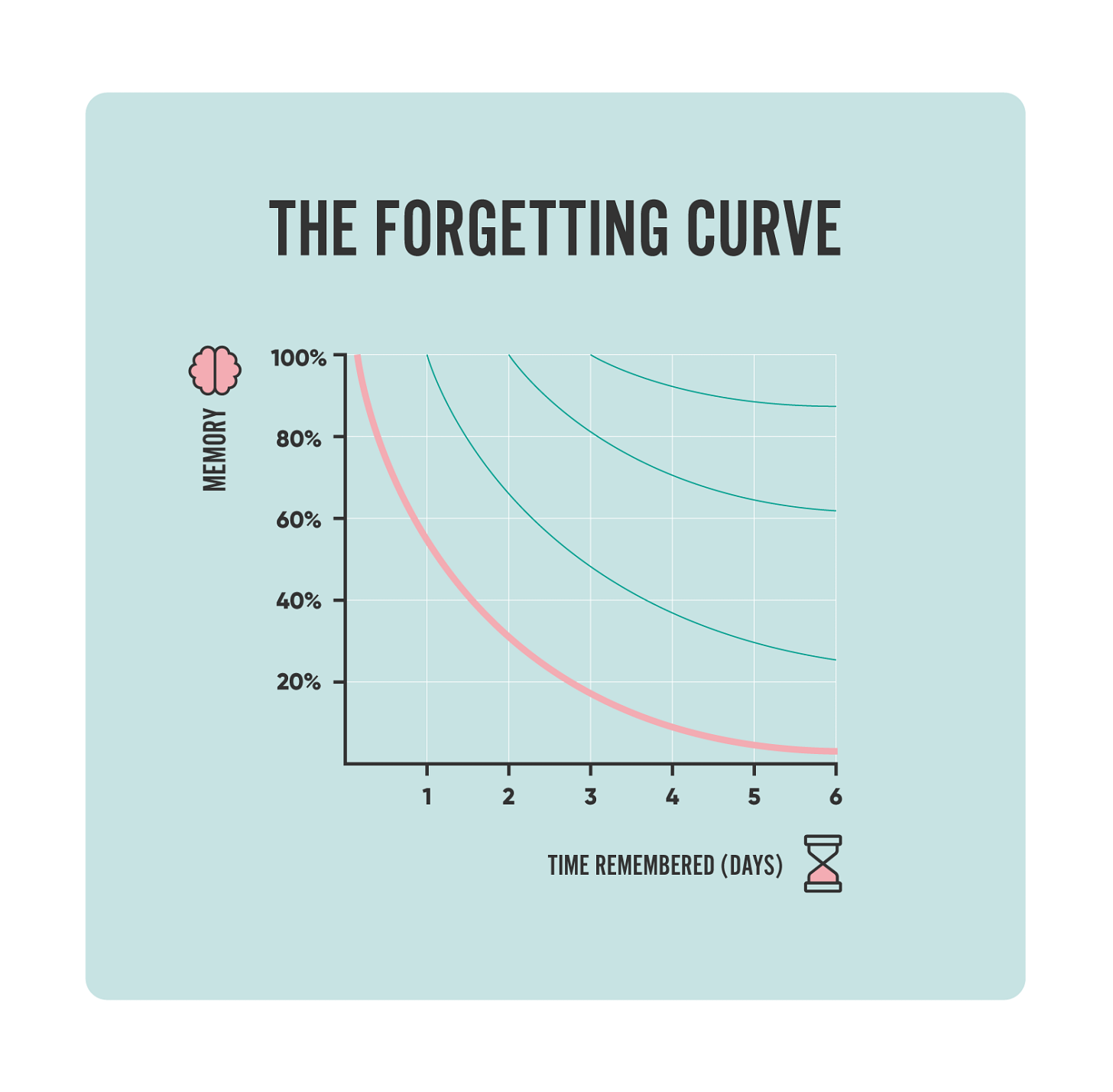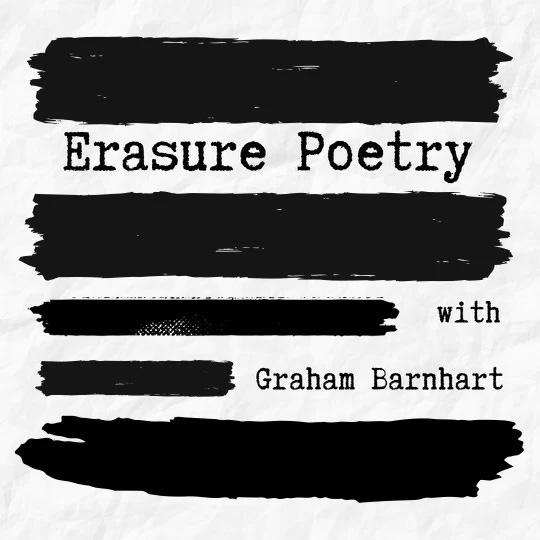There's No Place Like Commonplace
Or- Doing common things uncommonly well
Think.

Last week I promised a series on different schools of thought and techniques for building a system that allows you to manage, locate, and retrieve the information you need when you need it to make quick, strong, and relevant connections.
Taking in new information forces us to think, and thinking makes us better. It doesn’t matter if the information comes in the form of a book, article, post, podcast, conversation, or fortune cookie.
Of course, you are always responsible for determining the validity of the information by questioning the depth, objectivity, currency, authority, and purpose of the source.
But let’s assume you believe the information to be valid and useful, how will you retain it and retrieve it when you want to use it?
This is a question that thinkers have been wrestling with for millennia. It would be swell if we could rely on our brains to keep the info neatly cataloged and ready for use, but unfortunately, without intervention, we can forget half of what we learn within the first 24 Hours.
One of the earliest methods was to create a commonplace book.
The commonplace book differs from the journal in that it is used to collect the ideas, thoughts, poems, or speeches of others.
Many, like Leonardo Da Vinci kept hybrid journals that combined their thoughts with the thoughts of others.
But, the concept of the commonplace book goes back at least as far as Aristotle.
It was early in the 1st century A.D. when stoic philosopher Seneca discussed the compartmentalization of the commonplace book suggesting that:
“We should imitate bees,and we should keep in separate compartments whatever we have collected from our diverse reading, for things conserved separately keep better…”
It is simple enough to acquire a notebook, either paper or digital, and collect information. The challenge comes in the organization system that will ensure we can find what we need when we need it.
The simplest method is to divide the book into sections by topic, but this can be clumsy and wasteful when you devote a large section to the migratory patterns of the Northern Bobwhite Quail, and then discover that they are largely non-migratory.
To ensure that you are not wasting pages, you can turn to John Lock’s 1685 book, A New Method of Making Common-Place-Books. In it, he provides techniques for capturing quotations, ideas, and speeches, as well as suggestions on how to arrange material by subject and category.
I have kept a commonplace book using a standard A4 ledger for some time. It works, but it doesn’t work well. It’s too hard to keep information organized for easy retrieval.
I should say that I did not follow Mr. Lock’s advice on commonplace organization which begins with establishing an index shown below. I felt his method was too cumbersome.
But, despite the technique’s shortcomings, many notable authors famously kept commonplace books including Emerson & Thoreau (whose commonplace books are in the collection of Harvard), Samuel Taylor Coleridge, Mark Twain, and Virginia Woolf.
But I still think:
Next week we’ll take a look at how the Germans tackled the problem.
If you have a method for managing your information, I’d love to hear it.
Read. Getting Things Done
by David Allen
This book came out in 2001. It was probably great then (It was a NYT Best Seller). Now it is a little dated, but it does have some suggestions about how to organize and manage information that I found useful.
Write.
Below is the last in my long line of carpe diem poems:
But first, speaking of poetry, my friends at the Dead Reckoning Collective are hosting an Erasure Poetry course on June 4th with Grahm Barnhart, US Army veteran and author of The War Makes Everyone Lonely. It is only 70 bucks. You really can’t afford not to attend. Click on the image and sign up.
To Be Free
His back is bent, but broad and bears
The marks of lash and load
His callused feet are cut and raw
From unforgiving road.
His skin is leather-brown and burned
From life under the sky
His eyes half-closed but eagle sharp
See all that passes by.
He’s no stranger to cold hard ground
Beneath him for his bed
He’s gone days without any sleep
Weeks without being fed.
He grew accustomed to this life
For he was told he must
"It’s just the way it’s always been"
Said those he knew to trust.
But one day he asked them, "Why?"
And they just turned and stared
"It’s just the way it’s always been.
No one has ever dared."
He stood and straightened up his back
And then he wiped his brow
He slipped the yoke that held him
A prisoner to the plow.
He turned and caught the falling whip
And pulled it from the hand
He saw fear in eyes who’d never
Seen his kind take a stand.
He realized what he should have known
It now became so clear
It was not chains that held him there,
But unrelenting fear.
He called them all to rise up
And take their rightful place
They lowered heads and pulled the plow
Afraid to see his face.
He begged them, "Please, come with me
We’ll make a better way."
But they were servants to the plow
And so, they chose to stay.
He was unsurprised they scorned
The offer that he gave
He recognized, and rightly so,
You can’t free the willing slave.
He watched them pull, their load increased
He turned and walked away
With no remorse, but bitter grief
For those who chose to stay.
His path was rugged and lonely
He broke the trail alone
At first, he thought of turning back
He dreamed of going home.
But loneliness was soon replaced
Now, with his head held high
Morning brings a shackleless day
Evening, unbounded sky.
His mind, once filled with other’s thoughts
Now clear and free to think
He roams where land is free to hunt
and water clean to drink.
He’s one in one-thousand
To grasp if one will be free
The first and most important step
Is that he choose to be.
Repeat.
Words of wisdom from those who said it best.
“Data is not information, information is not knowledge, knowledge is not understanding, understanding is not wisdom.” Clifford Stoll
“We are drowning in information, while starving for wisdom. The world henceforth will be run by synthesizers, people able to put together the right information at the right time, think critically about it, and make important choices wisely.” E. O. Wilson
“Information is a source of learning. But unless it is organized, processed, and available to the right people in a format for decision making, it is a burden, not a benefit.” William Pollard
“We're not in an information age anymore. We're in the information management age.” Chris Hardwick
Thanks for reading. See you next Thursday!
Thanks for reading Think. Read. Write. Repeat.!
Share it with a friend or subscribe for free to receive new posts and support my work.








